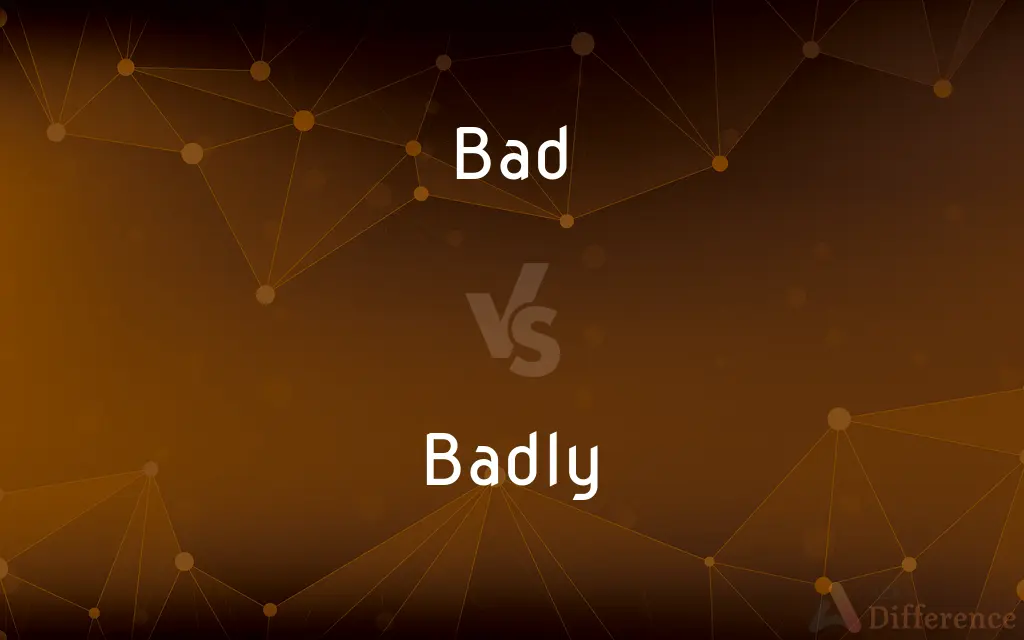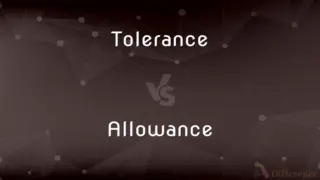Bad vs. Badly — What's the Difference?
By Fiza Rafique & Urooj Arif — Updated on March 20, 2024
Bad describes the quality of something as poor or undesirable, while badly is an adverb indicating the manner in which an action is performed poorly.

Difference Between Bad and Badly
Table of Contents
ADVERTISEMENT
Key Differences
Bad is an adjective used to describe something as not good or unfavorable. It highlights the quality or state of being of nouns and pronouns. For example, one might say, "The weather is bad today," indicating that the weather conditions are poor. On the other hand, badly is an adverb that modifies verbs, adjectives, or other adverbs, illustrating how something is done in a poor or unsatisfactory manner. For instance, saying, "He sings badly" focuses on the poor quality of the singing action itself.
While "bad" directly affects nouns and pronouns, making it clear that the subject itself is undesirable, "badly" implies a deficiency in the way an action is carried out. This distinction is crucial in sentences where the nature of the noun or the manner of the action needs to be clarified, as in, "The meal tastes bad," versus "She performed badly on the test."
In contexts where personal feelings or physical states are described, "bad" and "badly" can be used differently. Saying, "I feel bad" suggests emotional or physical discomfort, whereas "I feel badly" would incorrectly imply an issue with the physical capability of feeling.
Bad can also be used informally to mean 'seriously' or to a great extent, as in "He was in bad need of a haircut," which doesn't have a direct counterpart in the use of "badly" because the emphasis here is on the state of needing rather than the manner of needing.
The choice between "bad" and "badly" can sometimes change the meaning of a sentence significantly. For instance, "He was hurt bad" in informal language implies a serious injury, while "He was hurt badly" correctly focuses on the manner in which he was injured.
ADVERTISEMENT
Comparison Chart
Part of Speech
Adjective
Adverb
Modifies
Nouns, Pronouns
Verbs, Adjectives, Other Adverbs
Example Sentence
The movie was bad.
She danced badly.
Usage
Describes quality or state
Describes manner of action
Informal Usage
Can imply severity, e.g., "He was hurt bad."
Less commonly used informally
Compare with Definitions
Bad
Poor quality.
The food was bad.
Badly
In a morally reprehensible manner.
He behaved badly at the party.
Bad
Morally reprehensible.
Stealing is bad.
Badly
In a way that is harmful or injurious.
The policy affected the poor badly.
Bad
Severe or serious.
The storm caused bad damage.
Badly
Severely; greatly.
They were badly hurt in the accident.
Bad
Unfavorable.
She had bad luck with the weather.
Badly
In a poor or unsatisfactory manner.
He performed badly in the exam.
Bad
Harmful or injurious.
Smoking is bad for health.
Badly
With great distress or intensity.
She wanted to win badly.
Bad
Not achieving an adequate standard; poor
A bad concert.
Badly
In a bad manner.
Bad
Immoral or evil.
Badly
Very much; greatly. See Usage Note at bad1.
Bad
Vulgar or obscene
Bad language.
Badly
In a bad manner.
Things are going badly for her: she did badly in her exams owing to a badly designed studying schedule.
Don't think badly of me, give me the benefit of the doubt.
Bad
Disobedient or naughty
Bad children.
Badly
Very much; to a great degree.
I want it so badly.
Look at these split ends! You badly need a haircut!
Everything went badly wrong.
Bad
Disagreeable, unpleasant, or disturbing
A bad piece of news.
Badly
(Northern England) Ill, unwell.
He's never badly.
Bad
Unfavorable
Bad reviews for the play.
Badly
In a bad manner; poorly; not well; unskillfully; imperfectly; unfortunately; grievously; so as to cause harm; disagreeably; seriously.
Bad
Not fresh; rotten or spoiled
Bad meat.
Badly
To a severe or serious degree;
Fingers so badly frozen they had to be amputated
Badly injured
A severely impaired heart
Is gravely ill
Was seriously ill
Bad
Injurious in effect; detrimental
Bad habits.
Badly
(`ill' is often used as a combining form) in a poor or improper or unsatisfactory manner; not well;
He was ill prepared
It ill befits a man to betray old friends
The car runs badly
He performed badly on the exam
The team played poorly
Ill-fitting clothes
An ill-conceived plan
Bad
Not working properly; defective
A bad telephone connection.
Badly
Evilly or wickedly;
Treated his parents badly
To steal is to act badly
Bad
Full of or exhibiting faults or errors
Bad grammar.
Badly
In a disobedient or naughty way;
He behaved badly in school
He mischievously looked for a chance to embarrass his sister
Behaved naughtily when they had guests and was sent to his room
Bad
Having no validity; void
Passed bad checks.
Badly
With great intensity (`bad' is a nonstandard variant for `badly');
The injury hurt badly
The buildings were badly shaken
It hurts bad
We need water bad
Bad
Being so far behind in repayment as to be considered a loss
Bad loans.
Badly
Very much; strongly;
I wanted it badly enough to work hard for it
The cables had sagged badly
They were badly in need of help
He wants a bicycle so bad he can taste it
Bad
Severe; intense
A bad cold.
Badly
Without skill or in a displeasing manner;
She writes badly
I think he paints very badly
Bad
Being in poor health or in pain
I feel bad today.
Badly
In a disadvantageous way; to someone's disadvantage;
The venture turned out badly for the investors
Angry that the case was settled disadvantageously for them
Bad
Being in poor condition; diseased
Bad lungs.
Badly
Unfavorably or with disapproval;
Tried not to speak ill of the dead
Thought badly of him for his lack of concern
Bad
Sorry; regretful
She feels bad about how she treated you.
Bad
Bad·der, bad·dest Slang Very good; great.
Bad
Something that is below standard or expectations, as of ethics or decency
Weighing the good against the bad.
Bad
Badly.
Bad
A past tense of bid.
Bad
Unfavorable; negative; not good.
Hiring you was very bad for this company.
The weather looks pretty bad right now.
He is in a bad mood.
You have very bad grades.
Bad
Not suitable or fitting.
Do you think it is a bad idea to confront him directly?
Bad
Not appropriate, of manners etc.
It is bad manners to talk with your mouth full.
Bad
Unhealthy; liable to cause health problems.
Lard is bad for you. Smoking is bad for you, too. Grapes are bad for dogs but not for humans.
Bad
(chiefly applied to a person's state of health) Sickly, unhealthy, unwell.
Joe's in a bad way; he can't even get out of bed.
I went to the hospital to see how my grandfather was doing. Unfortunately, he's in a bad state.
I've had a bad back since the accident.
Bad
Not behaving; behaving badly; misbehaving; mischievous or disobedient.
Stop being bad, or you will get a spanking!
Bad
Tricky; stressful; unpleasant.
Divorce is usually a bad experience for everybody involved.
Bad
Evil; wicked.
Be careful. There are bad people in the world.
Bad
Faulty; not functional.
I had a bad headlight.
Bad
(of food) Spoiled, rotten, overripe.
These apples have gone bad.
Bad
(of breath) Malodorous; foul.
Bad breath is not pleasant for anyone.
Bad
False; counterfeit; illegitimate.
They were caught trying to pass bad coinage.
Bad
Unskilled; of limited ability; not good.
I'm pretty bad at speaking French.
He's a bad gardener; everything he tries to grow ends up dying.
Bad
Of poor physical appearance.
I look really bad whenever I get less than seven hours of sleep.
I don't look bad in this dress, do I?
Bad
(informal) Bold and daring.
Bad
(slang) Good, superlative, excellent, cool.
Man, that new car you bought is bad!
You is bad, man!
Bad
Severe, urgent.
He is in bad need of a haircut.
Bad
Not covered by funds on account.
He gave me a bad check.
Bad
Badly.
I didn't do too bad in the last exam.
Bad
Something that is bad; a harm or evil.
Bad
Error; mistake.
Bad
An item (or kind of item) of merchandise with negative value; an unwanted good. Bad (economics)
Bad
Used to scold a misbehaving child or pet.
Bad
(archaic) bid.
Bad
To shell (a walnut).
Bad
Bade.
Bad
Wanting good qualities, whether physical or moral; injurious, hurtful, inconvenient, offensive, painful, unfavorable, or defective, either physically or morally; evil; vicious; wicked; - the opposite of good; as, a bad man; bad conduct; bad habits; bad soil; bad air; bad health; a bad crop; bad news.
The strong antipathy of good to bad.
Bad
That which is below standard or expectations as of ethics or decency;
Take the bad with the good
Bad
Having undesirable or negative qualities;
A bad report card
His sloppy appearance made a bad impression
A bad little boy
Clothes in bad shape
A bad cut
Bad luck
The news was very bad
The reviews were bad
The pay is bad
It was a bad light for reading
The movie was a bad choice
Bad
Very intense;
A bad headache
In a big rage
Had a big (or bad) shock
A bad earthquake
A bad storm
Bad
Feeling physical discomfort or pain (`tough' is occasionally used colloquially for `bad');
My throat feels bad
She felt bad all over
He was feeling tough after a restless night
Bad
(of foodstuffs) not in an edible or usable condition;
Bad meat
A refrigerator full of spoilt food
Bad
Not capable of being collected;
A bad (or uncollectible) debt
Bad
Below average in quality or performance;
A bad chess player
A bad recital
Bad
Nonstandard;
So-called bad grammar
Bad
Not financially safe or secure;
A bad investment
High risk investments
Anything that promises to pay too much can't help being risky
Speculative business enterprises
Bad
Physically unsound or diseased;
Has a bad back
A bad heart
Bad teeth
An unsound limb
Unsound teeth
Bad
Capable of harming;
Bad habits
Bad air
Smoking is bad for you
Bad
Keenly sorry or regretful;
Felt bad about letting the team down
Was sorry that she had treated him so badly
Felt bad about breaking the vase
Bad
Characterized by wickedness or immorality;
Led a very bad life
Bad
Reproduced fraudulently;
Like a bad penny...
A forged twenty dollar bill
Bad
Not working properly;
A bad telephone connection
A defective appliance
Bad
With great intensity (`bad' is a nonstandard variant for `badly');
The injury hurt badly
The buildings were badly shaken
It hurts bad
We need water bad
Bad
Very much; strongly;
I wanted it badly enough to work hard for it
The cables had sagged badly
They were badly in need of help
He wants a bicycle so bad he can taste it
Common Curiosities
How is "badly" used in a sentence?
Badly is used to describe the manner in which an action is performed poorly.
Is it correct to say "I feel bad" or "I feel badly"?
"I feel bad" is correct when expressing sorrow or regret, while "I feel badly" suggests an impairment of the sense of touch.
What is the difference in use between "bad" and "badly"?
"Bad" describes the state or quality of a noun, while "badly" describes the manner of an action.
Is "badly" ever used informally to mean 'severely'?
Yes, but it's more formally correct than using "bad" informally to imply severity.
Can "bad" and "badly" be used interchangeably?
No, because "bad" is an adjective and "badly" is an adverb, so they modify different parts of speech.
Can "bad" imply severity in informal language?
Yes, such as in "He was hurt bad," implying a serious injury.
What does "bad" mean?
Bad describes something as poor in quality or unfavorable.
Can "bad" modify verbs?
No, "bad" modifies nouns and pronouns, not verbs.
What is an example of "bad" used in a sentence?
"The movie was bad" indicates the movie's poor quality.
How do "bad" and "badly" affect the meaning of sentences differently?
They change the focus between the subject's quality ("bad") and the action's manner ("badly").
How does the context change the use of "bad" and "badly"?
Context determines whether the quality of a subject or the manner of an action is being described.
What is an example of "badly" used in a sentence?
"She danced badly" focuses on the poor manner of dancing.
Is "badly" used with adjectives?
Yes, it can modify adjectives to intensify them, though this is less common.
Can "bad" be used to describe actions?
Indirectly, by describing the result or impact of the action, but not the manner of the action itself.
Why is it incorrect to use "badly" after verbs like "feel"?
Because it implies an issue with the ability to feel, rather than the state of feeling.
Share Your Discovery

Previous Comparison
Thereover vs. Whereover
Next Comparison
Tolerance vs. AllowanceAuthor Spotlight
Written by
Fiza RafiqueFiza Rafique is a skilled content writer at AskDifference.com, where she meticulously refines and enhances written pieces. Drawing from her vast editorial expertise, Fiza ensures clarity, accuracy, and precision in every article. Passionate about language, she continually seeks to elevate the quality of content for readers worldwide.
Co-written by
Urooj ArifUrooj is a skilled content writer at Ask Difference, known for her exceptional ability to simplify complex topics into engaging and informative content. With a passion for research and a flair for clear, concise writing, she consistently delivers articles that resonate with our diverse audience.














































